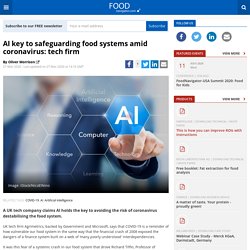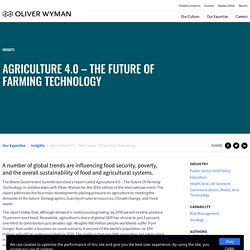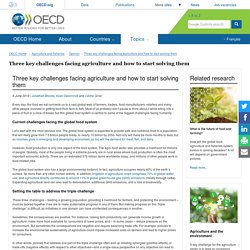

AI key to safeguarding food systems amid coronavirus: tech firm. UK tech firm Agrimetrics, backed by Government and Microsoft, says that COVID-19 is a reminder of how vulnerable our food system in the same way that the financial crash of 2008 exposed the dangers of a finance system built on a web of ‘many poorly understood' interdependencies.

It was this fear of a systemic crash in our food system that drove Richard Tiffin, Professor of Applied Economics at the University of Reading and Agrimetrics' Chief Scientific Officer then Director of the Centre for Food Security, to co-found AI company Agrimetrics. “I wanted us to understand the hidden risks that could spark a catastrophic chain of events,” said Tiffin. “Our food system is incredibly interdependent, but ironically it’s also incredibly disconnected. We have no idea of the long-term consequences of events like COVID-19. To avoid collapse, we need to understand these connections.” China’s Four Pests Campaign in the 1950s sought to eliminate rats, flies, mosquitoes and sparrows.
Feeding AI Agriculture 4.0 – The Future Of Farming Technology. A number of global trends are influencing food security, poverty, and the overall sustainability of food and agricultural systems.

The World Government Summit launched a report called Agriculture 4.0 – The Future Of Farming Technology, in collaboration with Oliver Wyman for the 2018 edition of the international event. The report addresses the four main developments placing pressure on agriculture to meeting the demands of the future: Demographics, Scarcity of natural resources, Climate change, and Food waste. The report states that, although demand is continuously growing, by 2050 we will need to produce 70 percent more food.
Meanwhile, agriculture’s share of global GDP has shrunk to just 3 percent, one-third its contribution just decades ago. Roughly 800 million people worldwide suffer from hunger. To meet these challenges will require a concerted effort by governments, investors, and innovative agricultural technologies. Dairy intensification: Drivers, impacts and alternatives. Artificial intelligence in agriculture white paper with summary v6. Artificial intelligence in agriculture white paper with summary v6. Three key challenges facing agriculture and how to start solving them.
6 June 2019 | Jonathan Brooks, Koen Deconinck and Céline Giner Every day, the food we eat connects us to a vast global web of farmers, traders, food manufacturers, retailers and many other people involved in getting food from farm to fork.

Most of us probably don’t pause to think about it while biting into a piece of fruit or a slice of bread, but this global food system is central to some of the biggest challenges facing humanity. Current challenges facing the global food system Let’s start with the most obvious one. The global food system is expected to provide safe and nutritious food to a population that will likely grow from 7.5 billion people today, to nearly 10 billion by 2050.
However, food production is only one aspect of the food system. The global food system also has a large environmental footprint. Can Agri-Tech deliver new 'golden age' for farmers? Increasing agricultural productivity by improving UK farming practices is among the key aims of the government’s Agri-Tech strategy – a £90m investment with four Agri-Tech centres at its heart.

The technology these centres produce aims to revolutionise farming with tools to raise profits and improve Britain’s farm productivity, which lags well behind that of its global competitors. For example, the contribution of UK farming to the economy would have been £4.3bn higher by 2013 had the rate of growth kept pace with the United States since 2000, according to AHDB figures. See also: Agri-Tech Q&A – How science and technology can help farming The four Agri-Tech centres Agricultural Engineering Precision Innovation (Agri-EPI) Agri-EPI harnesses precision agriculture to develop technologies that increase productivity and sustainability in the agri-food sector.View case study The UK is getting better but still lags behind competitor countries including the Netherlands, Germany and the US, he adds.
8 of the Greatest Challenges Facing Engineering. Engineers are, by definition, problem solvers and innovators.

Whether it’s to do with transportation, buildings, medical devices or energy sources, engineers are always looking for ways to make everyday life better for their fellow human beings. With the rapid rate at which changes are taking place in the world today, we all have to keep on our toes to stay ahead of the curve, and this is especially true in the engineering world.
To this end, here are 8 of the greatest challenges engineers can expect to face in the next decade. Find your perfect engineering job 1. With climate change becoming a growing topic that demands immediate attention, engineers are going to have to up their game to help mitigate potential catastrophe. 2. Water remains one of our most pressing needs and the shocking truth is that the lack of clean water causes more deaths worldwide than wars. 3. After the need for water comes the desperate need for a steady food supply. 4. 5. 6. 7. 8. Recommended Insights. The Moral Complexity of Agriculture: A Challenge for Corporate Social Responsibility.